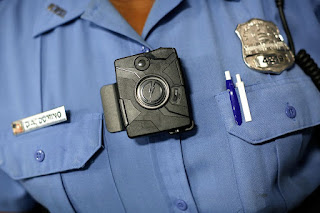Body Camera Use by Security Employees is Growing

Charlotte NC July 9 2021
These days, we have become accustomed to being watched anytime that we leave our homes.
Cameras are being used to monitor just about everything from rush hour traffic to school campuses, hospitals, businesses, and street crime.
And we all know by now that there are many wearable cameras being used by police and other law enforcement organizations in countries around the world.
They have proven to be an asset to the wearer and to their employees in cases of claims of excessive force, bad behavior and a variety of complaints that are filed regularly.
The first generation of ‘modern’ police body cameras was introduced around 2005 in the United Kingdom with a large-scale implementation in the United States around 2014.
The BWC has also been adopted by the military around the globe and in some areas, they are being used by medical professionals to assist in medical research and to reduce the likelihood of violent assaults against staff.
In some medical facilities, security staff members have also made them part of their standard equipment for reporting and evidentiary purposes, as well as to help to reduce frequent attacks by patients and visitors.
The use of body-worn cameras in public spaces where the public would have no expectations of privacy has long been ruled legal and on property that is owned and operated as a private business, the same also holds true.
Bathrooms, areas where students, patients or employees dress, undress or shower, would be off-limits to any recording because these are areas, even on private property, that a person would expect complete privacy.
Over the past few years, individual security officers and some private security providers as well as some proprietary security departments have invested in the purchase of BWC’s.
We have found that most are being used in general patrolling, apartment complexes, shopping centers, school campuses and a few, in hospital settings.
Of course, the use of such technology has served the law enforcement community well over the years in defending themselves against false claims, lawsuit protection and as evidence against an arrestee.
Video documentation has also been used as evidence against an officer during criminal and internal proceedings which overall is a good thing when an actual crime has been committed or an egregious or flagrant departmental policy violation has occurred. But sometimes, it has also been misapplied, misinterpreted, and used as a weapon against an officer.
Another consideration for the private user is the “Two Party” recording law which requires that all parties being audibly recorded be notified and agree to the recording.
Eleven states require the consent of every party of a conversation in order to make the recording lawful. These “two-party consent” laws have been adopted in California, Connecticut, Florida, Illinois, Maryland, Massachusetts, Montana, New Hampshire, Pennsylvania, and Washington.
While video may be recorded without consent in areas of no expectations of privacy, the audile would have to be removed before use.
So, are body cameras a valuable tool for the security industry or are they a liability?
In truth, the answer isn’t so cut and dry, and the decision for or against body cameras will depend on the risks within your facility.
“Some people have an all or nothing view of it, but in the real-world everything is a shade of grey,” says Bill H. Nesbitt, CPP, president of Security Management Services International, Inc. (www.smsiinc.com) in Newbury Park, California.
Nesbit says that he sees both sides of the discussion. On one hand, body cameras could serve as a valuable training tool to show officers appropriate de-escalation techniques with real situations. They could also provide a defense against frivolous claims if officers are forced to engage with a patient or visitor. At the same time, body cameras may create additional liability if an officer fails to adhere to the proper protocols.
Furthermore, Nesbit says, body cameras are not a valuable deterrent to criminal behavior.
Others argue that if used properly, body cameras could be a valuable tool for physical security and for healthcare security, although a comprehensive policy that accounts for how the video is used, retained, and released, would be necessary.
“From a liability prevention perspective, body cameras should be encouraged,” says Karim H. Vellani, CPP, CSC, president of Threat Analysis Group, LLC in Houston. “If security officers do the right thing, body cameras help. If security officers are doing the wrong thing, body cameras will likely bring out the truth.”
If you are a security officer or a security department or a contract security firm that uses body cameras, we would like to hear from you. Please contact us at helpdesk@privateofficer.com



